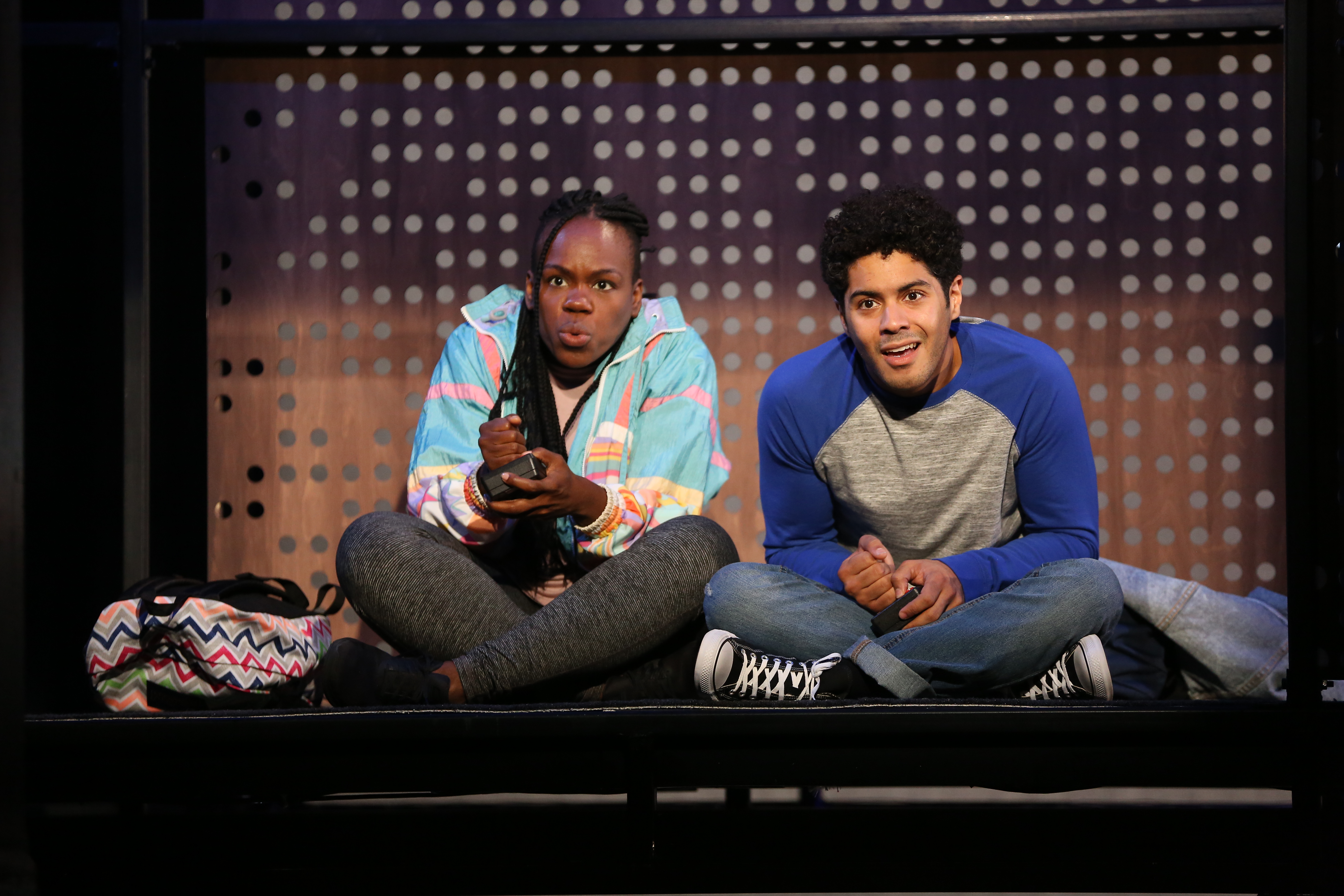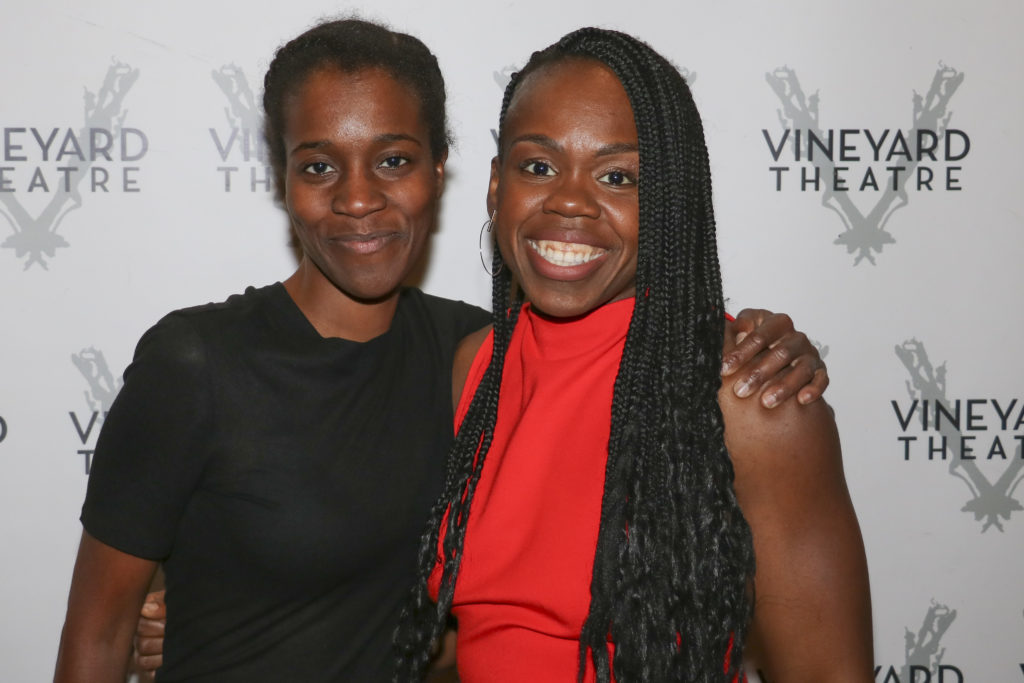Writer-actor Ngozi Anyanwu and director Awoye Timpo paired up for the current run of Anyanwu’s play “Good Grief” at the Vineyard Theatre. This isn’t the first time the pair has worked together. Timpo directed Anyanwu’s acclaimed “The Homecoming Queen” Off-Broadway last season at the Atlantic Theater. The collaborators’ new play is about a Nigerian-American girl’s journey of love, loss, and growing into adulthood.
In addition to her writing credits, Anyanwu has appeared on-screen in “The Affair,” “Law & Order: SVU,” “Split” and more. Timpo’s theater works include “Skeleton Crew,” “Sister Son/ji,” and “Carnaval.” She is also the producer of CLASSIX, a reading series examining classic plays from Black playwrights.
We chatted with the duo about “Good Grief,” the recent surge of African stories on the NYC stage, and how their relationship has shaped their work.
Tickets and more information about “Good Grief” are available at the Vineyard Theatre’s website. The show is playing through November 18.
W&H: What’s it like to be a woman in theater today, particularly in a New York theatrical season featuring more writers of color and women than perhaps ever before?
NA: It’s beautiful and kind of exciting. It takes less responsibility off of me to be the representation for every single Black girl or every single Black woman. It’s also really exciting that people get to see an array of our experiences and an array of structures of how to write. I think that this moment has released the burden of us having to be pinned down by writing a certain way and having to tell a certain story.
AT: In a way, I feel we have always been women of the theater so it feels … as it always has, where we get to be in a place where we get to tell stories from our own perspective and point of view. I don’t feel like my perspective on storytelling has personally changed, but I am for sure excited to be able to celebrate work by these women who are incredible storytellers like Ngozi.
W&H: Do you feel it is easier or harder in 2018 given the highly politicized climate we are living in?
NA: I don’t know if it’s easier than five or six years ago, but I do think that the politicized drama has made it more important to get us involved. I also feel that things have opened up for me because of the women who opened doors before me. There are more women of color being produced, period. That alone is better.
But other than that, I don’t know, because the leaders of most power structures are white so that is still something we have to overcome — to fit into how they see stories, how they see stories being told. The infrastructure and the directors and associate directors are all white. They are bringing in more women of color, but it’s all through their gaze and leadership. It’s still going to be hard, and we need to vary our leadership in the institutions.
W&H: Ngozi, what was the inspiration for “Good Grief”?
NA: It’s an autobiographical tale about a family going through grief. Personally, I lost a friend 10 years ago and this is that story. I started writing it about five years ago as I was graduating from grad school. I had lost him in undergrad so I was still thinking of him every so often.
The play started out as a poem and meditation on grief and it just grew and grew and grew. I went to [University of California San Diego] as an actor and worked with really beautiful playwrights and artists who encouraged me to keep writing the piece no matter what the structure was, and to meditate on those feelings.
W&H: There are definitely more African stories on the American stages right now.
NA: That has to do with the history. So many of our parents immigrated here in the late ’60s to early ’70s. You’re really seeing the children of those people, who were born in the ’80s. The majority of those people are in their early to mid-30s, coming into their artistic fruition, which is why I think you are seeing a surge now.
W&H: What is your collaboration like?
NA: We met 10 years ago when I was an intern at the Public Theater and Awoye was a Directing Fellow. I’m a Nigerian-American and she’s a Ghanaian-America. We bonded over being Black women in the arts. So when “The Homecoming Queen” came about — it was a second-generation story — I really wanted an African-American to be a part of it. After the Atlantic Theater picked it up, I asked for her. That show was a great and difficult collaboration because new plays are difficult. You have a short amount of time to work on a lot of material.
When “Good Grief” came about and I knew it was coming to New York and didn’t yet have a director, I felt space to fail or fly. We have a really good relationship because we’re good about pitching bad ideas and are open to listening to each other’s bad ideas. Awoye is a beautiful leader. Awoye holds space for people to be open and vulnerable and be their best and worst selves. She can really handle anything. She’s a collaborator I hope I will be working with for a long time.
AT: The best thing you can ask for in a collaborator is for someone who is just open and willing to listen, someone you can ask questions about the world with, without any sense of judgment. We’re two people coming together to try to make [the play] the best it can be. We really challenge each other to figure out how to do it and make things happen.

“Good Grief”: Carol Rosegg
W&H: What was the rehearsal process like for “Good Grief”?
AT: It was pretty amazing, actually. It’s a very collaborative process. We come in with a very good sense of the frame and how we want to tell the story. Then we let people live inside the frame.
The beautiful thing is that this is Ngozi’s third time engaging with this play as a production, so it was a really beautiful experience for us to have together. In addition to her being such a brilliant playwright and the creator of this piece and also being an actor in this piece, we had the institutional memory of the piece inside the room with us.
Ngozi is very gracious and generous. She really allowed people to investigate the stories and the characters, who are all people from her real life, and she gave everybody a lot of freedom to discover who these characters are. In addition to being very talented, the actors are just a very generous group of people. It was a wonderful and open process, and we all learned a lot along the way.
W&H: The show is very philosophical. It’s about transformation and mortality. It’s also very much a story of an immigrant family making roots in America and their expectations of one another. Ngozi, how important is it to you to honor the people behind the story?
NA: For me, it’s everything but it’s also very much about the story and the play. It was about capturing the moment but it’s also very much a homage. It’s very much a fictional play but I wanted to get the feeling of the time. These are people that I love a lot. I wanted the moments they got together to be magical.
Plus, it helps that the actors are all empathetic people who understand their characters, which is an important layer.
W&H: Awoye, you’re heavily immersed in the theater. How do you choose the projects you are working on?
AT: First of all, because of my history with Ngozi, it was a very easy one to say yes to. There’s a great line in the play where a character says, “Why do you answer?” And the response is “I answered because you called.”
For me, there are so many stories we can tell. There are so many stories about the contemporary time that we live in. There are so many stories about our history that we can tell. I am most excited to delve into who we are as human beings, what do we mean to each other, what we can mean to each other, what is our capacity inside our existence in this very complicated time we live in. I am always excited to celebrate or ask questions about our humanity and I feel like this definitely falls into that category.
W&H: Who are some of your mentors and women who inspired you?
NA: When I was graduating from graduate school, Dominique Morisseau had just started writing. She would hit me with plays that hadn’t even been produced. Even at the beginning of her writing career, you could tell from her early works that her career was about to blow up. She was always so open about giving her work away to actors.
Then there’s Lynn Nottage, who I’m getting to know and was always a mentor from far away, from a distance. I remember sitting through “Ruined,” which I saw three times. Suzan-Lori Parks’ work fueled me and gave me permission. Ntozake Shange, obviously, one of the first female playwrights, wrote one of the first plays I was ever handed.
These are women I didn’t know but they were far-away mentors just by having their plays existing. They inspired me and gave me permission to not worry about fitting into a structure.
AT: Funnily enough, the people I think are truly my mentors are actually men. But when I think of women whose artistry have inspired me along the way, I think of people like Julie Taymor and Anna Deavere Smith, who were hugely instrumental in the way that I think about theater.
When I first started to experience Julie Taymor’s work, it was filled with such a tremendous amount of imagination about what you were going to see inside the theater and what was possible inside of a theater. So her visual imagination and ability to take work and see it anew was very exciting to me.
When I saw and studied the work of Anna Deavere Smith, it was really an awakening about how a play could really touch on what the world can touch on politically, and how we can articulate that inside the theater and even beyond that, how theater can be used as a tool to begin a conversation outside the theater with a citizenry about who we are and who we want to be to and for one another.
Both of them really shaped my understanding of what’s possible in theater and art in general.
W&H: What are you both working on next?
NA: I am working on a TV show with ABC Signature and JuVee, Viola Davis’ production company. I’m also working on several commissions — one with the Atlantic Theater Company and I’m currently writing NYU’s third year’s grad school play.
AT: I’m working with Dominique Morisseau at the Long Wharf Theatre on one of the plays in her Detroit cycle called “Paradise Blue.”







